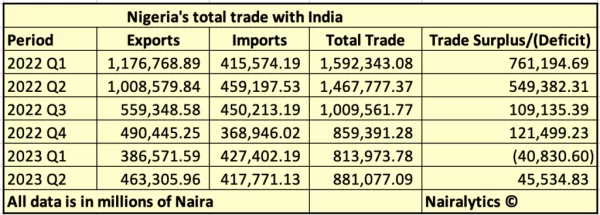Business
Nigeria’s trade exports to India decline by 61% in one year
The latest data from the National Bureau of Statistics (NBS) reveals that Nigeria’s exports to India have plummeted by a staggering 61% over the past year.
This comes as President Bola Ahmed Tinubu leads a corporate delegation from Nigeria to India for a business conference on the sidelines of the G20 summit held in the country. The conference is aimed at attracting foreign direct investment to the country.
India was Nigeria’s top export destination in 2022, however, recent data indicates that it has now slipped out of the top 5. India stopped being Nigeria’s lead export destination in the third quarter of 2022 as Spain took over.
According to NBS data, Nigeria’s trade exports to India in the second quarter of 2023 amounted to N463.3 billion, making India Nigeria’s sixth-largest export destination.
- This marks a sharp decline from the same period in 2022 when Nigeria’s trade exports to India reached N1 trillion, making India Nigeria’s largest export market at the time.
- Exports to India have been on a downward trend since the third quarter of 2022. During that quarter, total exports decreased to N619.2 billion, and by the last quarter of 2022, exports had further declined to N490.4 billion.
- Total exports to India have fallen by 61% from N2.1 trillion in the first half of 2022 to N849 billion in the first half of 2023.
- Total trade to India (including imports) has declined by 44.6% from N3 trillion in the first half of 2022 to just N1.69 trillion in the first half of this year.
Nigeria is currently running a thin trade surplus with India of just over N5 billion in the first half of 2023, a sharp decline from about N1.2 trillion same period in 2022.

Reasons for the Decline
The primary cause of this significant drop is the falling crude oil exports, which at their peak, accounted for as much as a trillion naira in trade between Nigeria and India.
- For instance, in the first and second quarters of 2022, crude oil exports to India stood at about N1.03 trillion and N1.09 trillion, respectively.
- However, a decline was observed in the second half of 2022, with exports dropping to N559.3 billion in Q3 and N420.8 billion in Q4.
- The downturn continued into 2023, with crude oil exports falling to just N327.8 billion and N368.2 billion in the first and second quarters, respectively.
- This overall decline in crude oil exports to India has also impacted Nigeria’s total crude oil exports.
- Data shows that total crude oil exports in the first half of 2023 were N10.6 trillion, compared to N11.5 trillion during the same period in 2022.
Nigeria’s loss is Russia’s gain
Nigeria seems to have lost much of its export market share in India to Russia due to the ongoing Russian-Ukraine war.
- The war has made Russian crude oil more cost-effective, which may have prompted India to reduce its reliance on Nigeria’s crude oil exports.
- According to a NY Times story, sighting the International Energy Agency, India buys “nearly two million barrels a day, roughly 45 percent of its imports.”
- Nigeria also has to contend with Iraq and other Middle Eastern countries which also export crude oil to India.
- India imports around 84% of its crude oil requirements, making it the third-largest oil consumer and importer in the world.
Liquefied Natural Gas (LNG), which accounts for about one-fourth of India’s total gas demand, is also largely imported, making India the fourth-largest importer of LNG. The country has a growing demand for both oil and natural gas.
President Tinubu’s visit to India has largely been about attracting investments into the country through foreign direct investments. However, the immediate need might be to get India to start importing Nigeria’a crude oil which is critical to helping Nigeria stabilize its forex inflows.














